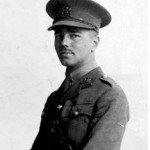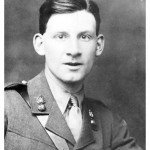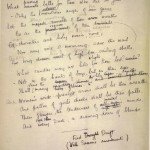
One of the most notable cultural expressions of World War I came from the pens of two young war poets. Wilfred Owen and Siegfried Sassoon were Britons of the upper middle-class, who enlisted early in the war and received commissions as junior officers. Owen was a disconsolate soldier, disillusioned both with the war and the men under his command. Sassoon, in contrast, was a decorated war hero, respected for acts of bravery which sometimes bordered on recklessness. He once charged a trench containing an entire German platoon, capturing it single-handed; for this feat Sassoon was awarded the Military Cross and nominated for the Victoria Cross. By 1917, however, the 31-year-old Sassoon had experienced enough. Exasperated, he drafted a mock resignation letter, criticising the war and affirming his intention to take no further part in it. Sassoon sent this missive both to his superior officers and a couple of press men, an act that could have earned him a court martial. But because of Sassoon’s admirable record, the army attributed this episode to a case of shell shock.
Sassoon was sent to ‘recover’ in a Scottish military hospital, where he met Wilfred Owen, an aspiring poet seven years his junior. Owen had low self-esteem and no regard for his own talents, but he idolised Sassoon, perhaps to the point of romantic love (Owen was probably homosexual, Sassoon was certainly bisexual). Sassoon noticed Owen’s literary ability and became his mentor; he encouraged him to adopt a more direct, lyrical tone in his poems, and to employ a confronting realism drawn from his own experiences. Owen followed Sassoon’s advice about having some of his poetry published: three pieces later appeared in a British left-wing journal. Owen also had some influence on Sassoon’s poetry, which from 1917 became more assertive about the horrors and hypocrisies of war. During his convalescence Sassoon wrote poetry which criticised British commanders (The General), the Anglican Church (They) and women who supported the war (Glory of Women).

By mid-1918 both men were recovered sufficiently for a return to active duty. Owen acquitted himself well as a soldier in the final months of 1918, winning the Military Cross for bravery. He was killed in action in France, just one week before the armistice of November 1918. Legend has it his mother, with whom Owen was very close, received the telegram bearing word of his death as victory bells were being tolled in her village. Sassoon survived, serving out the rest of the war before returning to England. There he reviewed, redrafted and compiled his own war poetry, as well as penning new material. Aware that his friend Owen’s writing surpassed his own, Sassoon sought to bring it to public attention. Only five Owen poems had appeared in print while he was alive, so Sassoon edited a collection for posthumous publication in 1920.

Owen’s work was well received and widely discussed in British literary circles, which hailed him as the nation’s finest war poet. His poetry is filled with despair, graphic imagery and metaphor. Perhaps Owen’s best-known piece, Anthem for Doomed Youth, is a fatalistic and mournful ode to a generation of dead young soldiers. In the style of a romantic sonnet, it likens Western Front soldiers to “cattle” facing imminent slaughter. Another, Dulce et Decorum Est, tells of a group of battle-weary soldiers trudging to a place of long-awaited rest, when they are attacked with poison gas. Its title comes from the Latin poet Horace’s verse “Dulce et decorum est pro patria mori” (or ‘It is sweet and fitting to die for your country’). But Owen’s use of this quote is ironic: he later refers to it as “the old lie”.
“If the shadow of John Keats looms over much trench poetry, his craving for a ‘life of sensations rather than of thoughts’ seems to have achieved a perverse validation in the world of the trenches. ‘Our youth’, recalled Robert Graves, ‘became all flesh and waived the mind’. The trench experience was one of the most sustained and systematic shattering of the human senses: it stripped man of the protective layers of civilisation and thrust his naked, fragile body between the ravages of industrial modernity, on the one hand, and the chaos of formless matter on the other.”
Tim Kendall, English poet
Though Owen and Sassoon are the Great War’s best-known poets, there are several others worthy of study. Robert Graves, one of England’s greatest 20th century poets, was a war veteran and on friendly terms with both Sassoon and Owen. Graves penned several war poems but later destroyed or decried them, thinking them not good enough for public consumption. Another literary great, Rudyard Kipling, wrote war poetry after the death of his beloved son in 1915. Herbert Asquith Junior, son of the British prime minister, was an artillery officer who wrote lyrical poetry about fallen soldiers. Germany also had a small quota of war poets. Perhaps the best-known was Stefan George, whose 1914 poetry predicted doom and destruction for Germany. In Der Krieg (‘The War’) George resigns himself from taking sides, writing “In the quarrel as you feel it, I take no part … You who swing the broadsword over mounds of corpses.” Another German, August Stramm, wrote similarly confronting war poetry before he was shot through the head on the Eastern Front in 1915. A collection of Stramm’s work, titled Dripping Blood, was published after the armistice.
Wilfred Owen, Anthem for Doomed Youth
Siegfried Sassoon, The Rank Stench of Those Bodies
John McCrae, In Flanders Field
Max Plowman, When It’s Over
Charles Hamilton Sorley, To Germany
W. H. Littlejohn, Suvla Bay
Patrick MacGill, In The Morning
Vera Brittain, The German Ward

1. Wilfred Owen and Siegfried Sassoon are the best known and most widely studied war poets of World War I.
2. Both were young officers in the British army who were scarred by their experiences of battle on the Western Front.
3. They met while recuperating and Sassoon became Owen’s mentor, encouraging him to refine and publish his poetry.
4. Owen was killed in the last days of the war, after which Sassoon worked to bring his poems to public attention.
5. Much of Owen’s and Sassoon’s poetry focuses on the plight and suffering of soldiers, as well as the pointless human sacrifice of industrialised warfare and criticisms of those who lead and support the war.
© Alpha History 2014. Content on this page may not be republished or distributed without permission. For more information please refer to our Terms of Use.
This page was written by Jennifer Llewellyn, Jim Southey and Steve Thompson. To reference this page, use the following citation:
J. Llewellyn et al, “War poets” at Alpha History, https://alphahistory.com/worldwar1/war-poets/, 2014, accessed [date of last access].
